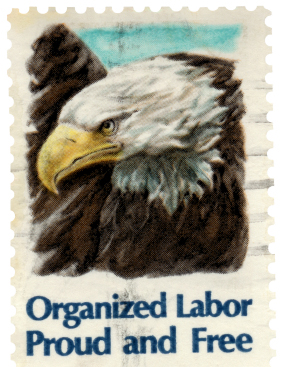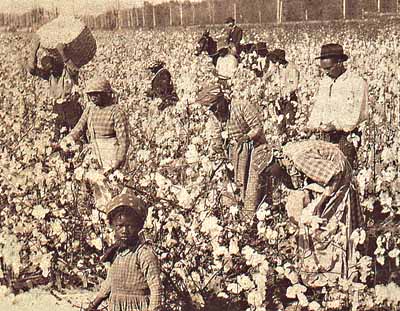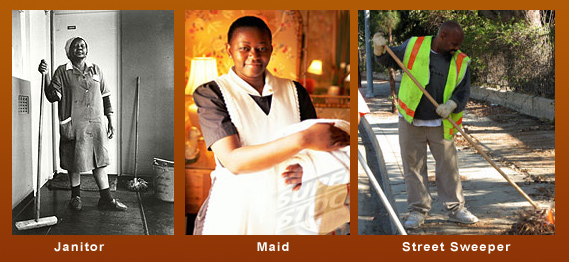|

CELEBRATION OF VOCATIONS (LABOR DAY)
CULTURAL RESOURCES
Sunday, September 5, 2010
Laura Morgan Roberts, Guest Cultural Resource Commentator
Author, professor, and speaker on leadership, diversity and organizational behavior who currently teaches at Georgia State University, Atlanta, GA
I. Introduction
The history of Labor Day dates back to the late 1800s, when the average American (including some children) worked 12-hour days, seven days a week, in order to make a living. Workers organized in unions to call for improved wages and working conditions. To seek greater recognition of their contribution to the building of their country, 10,000 workers marched from city hall to Union Square in New York City in the first Labor Day parade on Tuesday, September 5, 1882. Twelve years later, workers of the Pullman Palace Car Company went on strike to protest wage cuts and the firing of their union leaders. Though they gained the support of the American Railroad Association in stopping all rail traffic out of Chicago, they were met with violence by federal troops. After much bloodshed, Congress designated the first Monday in September as Labor Day.1
On Labor Day, we celebrate workers and the importance of labor. We honor the efforts of those who have sacrificed to improve access and working conditions for all. We recognize those in society who have less power and privilege and therefore do not typically receive much appreciation or acclaim for their labor. Consistent with the Old Testament passage in Deuteronomy 24:14-15, we are reminded of the need to provide fair wages and uphold the dignity of those in our society who are less privileged.
Etymology: Livelihood
The origins of the word livelihood (org. livelode) can be traced to 1300, when it meant the quality or state of being lively. That meaning is no longer in use, and the word livelihood (spelling assimilated 16th century) now connotes "means of keeping alive" or "means of support or subsistence.”2 To say that one's labor is one's livelihood connotes that the primary purpose of work is to sustain life.
II. The African American Experience of Labor and Livelihood

A. Punitive Labor
According to the Merriam-Webster dictionary, the word “labor” connotes an expenditure of physical or mental effort, especially when difficult or compulsory.3 This exertion of effort is required to bring forth life, as in the case of laboring through childbirth, and to sustain life, as in the provision of goods and services that garner an income. Historically, the African American experience of labor has been disconnected from these life-giving outcomes. For centuries, African Americans labored on plantations by force, not by choice. They worked tirelessly to meet unrealistic standards in toxic conditions, with little material benefit for their labor and no sense of ownership of what they had produced. Post-emancipation, African Americans continued to take on the most physically demanding work and received relatively little material reward for doing so. Due to educational disparities and discriminatory hiring practices, those who had the least resources put forth grueling effort with minimal return.
As a consequence, manual labor was experienced as a form of punishment (consistent with the interpretation of Genesis 3:19, whereby labor is mandated as the punishment for sin). The black church became the sanctuary for African American and other marginalized workers; a symbolic return to Eden in the sense of finding a place of rest where one’s identity would be restored with the dignity that goes with belonging to a heavenly Kingdom of saints.
B. Privileged Labor

Recent workplace trends situate African Americans in some of the lowest and in some of the highest status occupations in the world. President Barack Obama currently labors on behalf of the United States of America in its highest elected office. African American professors, physicians, lawyers, politicians, corporate executives, educational administrators and many others in white collar professions are keenly aware of the rather short history (and still limited numbers) of African American representation in their field.
As an African American female who earned a Ph.D. from the University of Michigan at the age of 27, I know that I am not far-removed from this history. Long before I was born, my own great-great grandmother was a cook at the University of Virginia where I earned my bachelor's degree. When my grandmother attended the University of Michigan in 1936, she was not allowed to live on campus with her white classmates. I am not alone in my connection to so many African American "firsts."
In many ways, African American professionals are considered privileged, due to our access to educational, career, financial, and social resources; professional labor is a means of enriching the livelihood of one's entire family. Yet, African American professionals are also subjected to the injustices of racial bias, stereotyping, and exclusion in the workplace. They, too, struggle with beliefs that their efforts are not rewarded with the recognition that they deserve, receiving fewer opportunities for advancement and leadership. Moreover, many African American professionals bear the psychological costs of assimilating into a predominately white professional culture, which can diminish one's own sense of self-worth. Here again, the association between labor and livelihood is tenuous for African Americans.4
It is also important to recognize that many African Americans still suffer from an inability to provide for themselves and their families after having been laid off or fired from their companies. African Americans have been affected most adversely by economic downturns; currently, African Americans have the highest national unemployment rate of all racial/ethnic groups at 15.8%.5 Many African Americans are underutilized, working outside of their fields of interest or expertise so that they can make ends meet and secure an honest living for their families.6 Thus, African Americans continue to wrestle with the ambivalence of feeling that their labor is a form of punishment that strips them of their sense of worth and livelihood --- while at the same time, feeling fortunate to be able to work for pay given the historical and current barriers to paid employment. This ambivalence encapsulates African Americans’ complicated feelings about their labor and livelihood in America.
C. Purposeful Labor

To find peace and sustain the fullness of life in the midst of challenging working conditions, many African Americans infuse their work with a higher sense of purpose. Some consider themselves called by God to serve others on earth in a variety of capacities, even by those tasks that society deems most menial. Reverend Dr. Martin Luther King, Jr. reminded us of the call to labor in excellence to give glory to God:
...If you are called to be a street sweeper, sweep streets even as Michelangelo
painted, or Beethoven composed music, or Shakespeare wrote poetry.
Sweep
streets so well that all the hosts of heaven and earth will pause to say, “Here
lived a great street sweeper who did his job well.”7
Candice Billups is an example of such an individual who labors to serve with excellence and love.8 Her labor sustains her own livelihood, but also enlivens others. Candice works in environmental services as a custodian for the University of Michigan's Cancer Center. She has worked for the UM Hospital for over 30 years and in the Cancer Center since it opened over a decade ago. While many custodians may experience their labor as toil, Candice Billups says that she loves her job because she loves her patients. She feels that she has a lot to offer sick people, and her job is to be there for the patients and their families. How does she do this? First and foremost, she tries to have a smile on her face every day and to bring humor and levity to those receiving treatments. She wants them to be comfortable in the Center, so she ensures that the environment is always clean and smells fresh. She knows that she is not capable of administering medication, but she proudly provides Kleenex, crackers, water and other such supplies to the patients and their families. She comforts them when they are most sick, reassuring them that their nausea and spills are her "job security" and reminding them that "God loves you" even when they receive disappointing news about their diagnosis.
Though there are days that the sickness and death become overbearing and she considers whether she should move to another unit, she always prays about it and returns to work the next day with the conviction that she is needed there. Candice Billups, an African American custodian, refers to her work colleagues as a family. The physicians, nurses, and medical assistants all know her name, and she says they work together as a team. Though she likely earns the lowest wages on the team, her labor is life-giving because it is infused with dignity, excellence and care for others. She has a clear sense of purpose about why she labors to create an environment of healing for others.
In the face of indignity, some workers sustain their spirits through their belief that earthly efforts will yield heavenly fruit. Dr. Rachel Remen retells this parable by the Italian psychiatrist Roberto Assagioli.9 The parable is about three stone cutters who are building a cathedral in the Middle Ages.
You approach the first man and ask him what he's doing. Angrily he turns to
you and says, "Idiot! Use your eyes! They bring me a rock, I cut it into a block,
they take it away, and they bring me another rock. I've been doing this since I
was old enough to work, and I'm going to be doing it until the day that I die."
Quickly you withdraw, go the next man, and ask him the same question. He
smiles at you warmly and tells you, "I'm earning a living for my beloved family.
With my wages I have built a home, there is food on our table, the children are
growing strong." Moving on, you approach the third man with this same question.
Pausing, he gives you a look of deep fulfillment and tells you, "I am building a
great cathedral, a holy lighthouse where people lost in the dark can find their
strength and remember their way. And it will stand for a thousand years!"
Each of these men is doing the identical task. Finding a personal meaning in your work opens even the most routine of tasks to the dimension of satisfaction and even joy. We may need to recognize meaning for the resource it is and find ways to pursue it and preserve it.
African American laborers, like Candice Billups, have become expert in deriving personal meaning from labor, even when they do not receive the material rewards or social recognition for their hard fought effort. As Marian Wright Edelman states, "never work just for money or for power. They won't save your soul or help you sleep at night."10 Knowing that one's laboring is not in vain, and that there is nobility in even the most menial tasks, can be life-sustaining. On Labor Day, we salute those whose labor may be invisible and unrewarded in the public eye, but who are recognized in God's eyes for the integrity with which they toil - from the boiler room to the board room.
III. Three Songs that Speak to the Moment
The song, "Is My Living In Vain?" and the line in the song, "Is my labor is vain?" encapsulate the yearning desire for confirmation that one's earthly efforts will indeed yield heavenly fruit. African Americans derive strength from knowing that, even in the face of current indignities, "up the road" they will experience "eternal gain." This also gives them the strength to fight for justice while on earth.
Is My Living in Vain?
Is my living in vain
Is my giving in vain
Is my praying in vain
Is my fasting in vain
Am I wasting my time
Can the clock be rewind
Have I let my light shine
Have I made ninety-nine
No, of course not
It's not all in vain
No, no LORD, no
Cause up the road is eternal gain
Is my praying in vain
Is my labor in vain
Is my singing in vain
Is my speaking, is it in vain
Is my playing the organ in vain
Is my praying in vain
Is my, is my, is my labor in vain
Is my singing, singing, singing, in vain
No, of course not
No, of course not
No, of course not
No, No, no, no, no, no, of course not
No, No, no, no, no, no, of course not
It's not all in vain
Up the road is eternal gain.11
The song, "God Bless the Child" reminds us of the importance of labor and livelihood, in having the means to sustain oneself.
God Bless the Child
Them that's got shall get
Them that's not shall lose
So the Bible said and it still is news
Mama may have, Papa may have
But God bless the child that's got his own
That's got his own
Yes, the strong gets more
While the weak ones fade
Empty pockets don't ever make the grade
Mama may have, Papa may have
But God bless the child that's got his own
That's got his own
Money, you've got lots of friends
Crowding round the door
When you're gone, spending ends
They don't come no more
Rich relations give
Crust of bread and such
You can help yourself
But don't take too much
Mama may have, Papa may have
But God bless the child that's got his own
That's got his own
Mama may have, Papa may have
But God bless the child that's got his own
That's got his own
He just worry 'bout nothin'
Cause he's got his own.12
The spiritual, "I'm Building Me a Home" reminds us that for Christians the ultimate fruit of our labor on earth is the production of a heavenly home.
I'm Building Me a Home
I'm building me a home
I'm building me a home
This earthly house
is gonna soon decay
And my soul gotta have somewhere to stay
Oh my Lord
When you hear me prayin'
I'm building me a home (My Lord)
This earthly house
is gonna soon decay
And my soul gotta have somewhere to stay
Through many dangers toils and snares
I have already come
His Grace brought me safe thus far
And I know it will lead me home
When you hear me moanin'
I'm building me a home
This earthly house
is gonna soon decay
And my soul gotta have somewhere to stay
When you hear me shoutin' (Yes, Lord shoutin')
I'm building me a home (Yes my Lord)
This earthly house
is gonna soon decay
And my soul gotta have somewhere to stay.13
Notes
1. "Labor Day History." History Channel.com. Online location: http://www.history.com/videos/history-of-labor-day#history-of-labor-day accessed 25 February 2010
2. "Livelihood." Online Etymology Dictionary. Online location: www.etymonline.com accessed 25 February 2010
3. "Labor." Merriam Webster Dictionary. Online location: http://www.merriam-webster.com/dictionary/ accessed 25 February 2010
4. Bell, Myrtle P. Diversity in Organizations. Mason, OH: Thomson South-Western, 2006.
5. United States Bureau of Labor Statistics. Online location: http://www.bls.gov/news.release/empsit.nr0.htm accessed 25 February 2010
6. Sum, Andrew, and Ishwar Khatiwada (with Sheila Palma). "Labor Underutilization Problems of U.S. Workers across Household Income Groups at the End of the Great Recession: A Truly Great Depression among the Nation's Low Income Workers amidst Full Employment among the Most Affluent." Boston, MA: Center for Labor Market Studies, February 2010.
7. King, Martin Luther, Jr. Famousquotesandauthors.com. Online location: http://www.famousquotesandauthors.com/authors/martin_luther_king__jr__quotes.html accessed 25 February 2010
8. Wrzesniewski, Amy, and Jane Dutton. "Having a Calling and Crafting a Job: The Case of Candice Billups." Ann Arbor, MI: Center for Positive Organizational Scholarship, Ross School of Business, University of Michigan.
9. Remen, Rachel. Rachelremen.com. Online location: www.rachelremen.com/recapturing.html/ accessed 25 February 2010
10. Edelman, Marian Wright. Thinkexist.com. Online location: http://thinkexist.com/quotes/marian_wright_edelman accessed 25 February 2010
11. "Is My Living In Vain?" The Clark Sisters. Lyricstime.com. Online location: http://www.lyricstime.com/the-clark-sisters-is-my-living-in-vain-lyrics.html accessed 25 February 2010
12. Billie Holiday. "God Bless the Child." Songlyrics.com. Online location: http://www.songlyrics.com/billie-holiday/god-bless-the-child-lyrics accessed 25 February 2010
13. "I'm Building Me a Home." Composer unknown. Performed by the Morehouse College Glee Club. School Daze (soundtrack). New York, NY: Columbia Records, 1988.
|